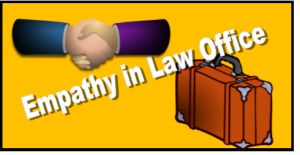Here’s a Jedi Mind Trick That Will Make Your Practice Fly
 One of the most valuable legal skills isn’t taught in law school or tested on the bar exam.
One of the most valuable legal skills isn’t taught in law school or tested on the bar exam.
It’s empathy – the ability to step into someone else’s shoes and see things from their perspective – and it’s powerful stuff.
Empathy can attract clients, win cases and take your practice to the next level. And though it comes more naturally to some people than others, psychologist Guy Winch, who blogs at The Squeaky Wheel, says anybody can get better at it.
“Experiencing empathy requires a Jedi mind trick of sorts,” he writes here. “It involves directing our awareness to a place our mind does not go of its own accord – to what it feels like to be another person-lingering there for a moment so we register the emotional and cognitive landscape, and then returning to our own reality.”
Test Your Empathy
Winch has a simple scenario for testing your empathy level. Imagine that your bank charges a late fee you think is unwarranted. You call customer service to complain. When the representative picks up, your blood is boiling. You feel you’ve been wronged. You’re frustrated, powerless and angry.
These are not empathetic feelings. In fact, they’re the polar opposite. They’re all about you, whereas empathy is all about the other person.
“In this case, we should imagine what it is like to sit in a small cubicle all day facing a computer that dictates to us almost everything we do and say. We have to imagine we are low-salaried employees, single parents or students working to pay for school. We have to envision spending our days dealing with frustrated and angry customers, getting yelled at regularly, called horrible names and not being able to respond in kind for fear of losing our jobs. And then, even before our heart rate slows down from the last abusive caller, another call comes in.”
By taking a moment to step into the representative’s shoes, it might occur to us that there is a better way to get what we want than screaming and yelling.
“[B]eing kind and respectful might elicit feelings of relief and gratitude in the representative who was probably bracing for another angry caller. This in turn might make them feel more motivated to help us resolve our issue so they go the extra mile or make special efforts on our behalf.”
Four Ways to Practice Empathy
1. Don’t make assumptions. In the above hypothetical, it is pointless to assume the representative will act in a courteous and professional manner. Empathy deals with reality, not fantasy.
2. Avoid “should” and “should not.” Anytime you catch yourself thinking someone should do this or should not do that, you’re headed for trouble. Empathy takes others as they are, not how you think they should be.
3. Pause before reacting. In stressful situations, we feel a rush of anxiety, perhaps even fear. Be patient. Let these initial feelings pass in order to create space for empathy. “We have to taste the other person’s world and register their landscape, which means we must take the time to paint that landscape as fully as we can.”
4. Seek first to understand, then to be understood. This is Habit #5 of the 7 Habits of Highly Effective People.
We all want to be understood. We are drawn to people who “get” us. Showing empathy might not necessarily make you a better person, but it will definitely make you a better lawyer.
Sources:
- Psychology Today https://www.psychologytoday.com/blog/the-squeaky-wheel/201103/how-test-your-empathy
- The Squeaky Wheel https://www.psychologytoday.com/blog/the-squeaky-wheel
- Seven Habits of Highly Effective People https://www.stephencovey.com/7habits/7habits-habit5.php




